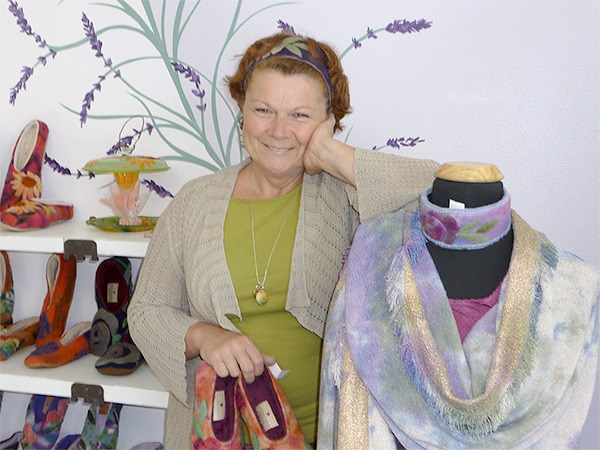The Bag Ladies of Sequim
Location: 167 W. Washington St., Sequim
Phone: 801-918-3202
Website: TheBagLadiesofSequimWA.com
Hours: 11 a.m.-7 p.m. Thursday-Sunday
Victoria Julian-Gray, a 2013 transplant from Utah, has taken her lifelong love of fiber arts to a cheery storefront in an alley behind Washington Street in downtown Sequim. It’s a mouthful, but she named her craft shop The Bag Ladies of
Sequim, WA — a nod to her mother and herself, both fiber artists.
“She’s the old bag, I’m the young bag,” Julian-Gray quipped.
At 87 and an artist in her own right, Leona Julian still is involved in helping her daughter create felt from 100 percent wool to make hand-dyed wearable fiber art such as slippers, headbands, bags, purses and coin bags. She also weaves shawls on a knitting machine that appear woven on one side and knitted on the reverse that will be featured in the shop, plus she cuts out decorative appliqués for the felt goods.
The store held its grand opening on Aug. 4 with handcrafted items from five other invited local artisans who share the shop. They contribute handmade soaps, whimsical pin cushions, shawls made from repurposed bed spreads, glass-infused dishes, jewelry and art.
Julian-Gray said she expects to add another 10 for a sort of craft cooperative for cottage businesses, including more felted products, pottery and stained glass.
“It will be an eclectic lot of one-of-a-kind high quality crafts with a lot of wearable art,” she said.
“I’ve done fiber arts in one form or another for years,” Julian-Gray said. “After college, I started a custom ski clothing business in Salt Lake City, which I ran for 15 years, marketing it at art festivals.”
After a career shift to real estate and retiring from it, she realized she wanted to to get back into retail in a place with a “Mayberry” flavor. Sequim fit the bill.
“I started out at the Sequim Farmers Market and the whole idea of the shop was to have an artsy-crafty place that could be open year-round,” Julian-Gray said.
The art of felting
From picking up a rectangle of felt from a fabric store or craft shop, you’d never realize that it’s very labor intensive to make — and Julian-Gray adds another layer of difficulty by repurposing old wool garments, specifically of Merino wool, for her felt. She can tell if it’s pure Merino by touch.
“Why fill up the landfill — why not make something useful of what you’ve got?” Julian-Gray asked. “I repurpose the wool from coats, skirts, blankets — things that Goodwill usually doesn’t want. I use the ‘boiled wool’ method starting with knitted or woven fabric and beating the … out of it in hot water and tons of soap for two hours, then putting it in ice water and doing it over and over so it will not shrink and will keep its colors. Felting gives the wool a completely different texture.”
However, since moving to Sequim, she’s had to outsource her used wool clothing gathering to friends in Utah because she realized she’s in the land of the Northwest fleecy, where wool is hard to come by — and nothing but 100 percent wool will make felt.
Several dozen vividly patterned slippers are perched on recycled bifold doors, hung horizontally, and the shop has comfortable chairs and a settee for trying on your favorite pair. Women’s slippers are in two styles, slip-on and ankle length, and come in sizes 5-11; men’s range from size 8-16, and all have plush insoles with suede bottoms.
The slippers come in fanciful color combinations such as teal, coral, purple and orange with appliqués. Men’s slippers are in more manly hues. Julian-Gray even has slippers for infants and toddlers made from the knit cuffs of cashmere sweaters.
In addition to the footwear, the shop carries women’s shirts by Dhama Trading in a cool and breathable fabric.
When she’s not assisting customers, Julian-Gray is at her Pfaff sewing machine, adding to the inventory.



